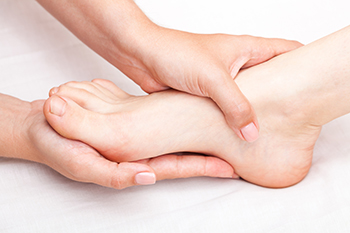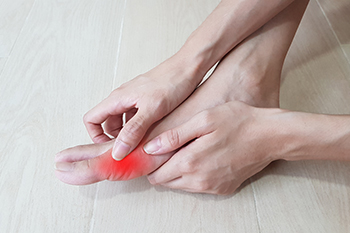
The feet can offer important clues about thyroid health, often showing symptoms that are easy to overlook. Cracked heels may be one of the earliest signs, especially when dryness persists despite moisturizing. Itchy feet can also occur due to slowed skin cell turnover, commonly seen with low thyroid function. Cold feet are another frequent symptom, as the thyroid helps regulate body temperature and poor circulation may result from an underactive thyroid. Additionally, swollen feet can develop due to fluid retention, which sometimes accompanies hormonal imbalances linked to thyroid conditions. These foot-related signs should not be ignored, especially when they appear together or persist. If you have any of the above foot symptoms, it is suggested that you consult a podiatrist who can treat various foot conditions, and discuss the connection regarding possible thyroid disease.
When dealing with systemic disease of the feet, it is extremely important to check the affected areas routinely so that any additional problems are caught quickly. If you have any concerns about your feet and ankles contact one of our podiatrists from Family Foot Health Center. Our doctors will assist you with all of your podiatric needs.
Systemic Diseases of the Feet
Systemic diseases affect the whole body, and symptoms usually are displayed in the feet. This condition can make a patient’s ability to walk unbearable. Systemic diseases include gout, diabetes mellitus, neurological disorders, and arthritis.
Gout – is caused by an excess of uric acid in the body. Common symptoms include pain, inflammation, and redness at the metatarsal/phalangeal joint of the base big toe. Gout can be treated by NSAIDs to relieve pain and inflammation, and other drugs that lower the acid levels in the body.
Diabetes mellitus – is an increase in the level of blood sugar that the body cannot counteract with its own insulin. Failure to produce enough insulin is a factor in Diabetes.
Diabetes of the Feet
Diabetic Neuropathy – may lead to damaged nerves and affect the feet through numbness and loss of sensation.
Peripheral Vascular Disease – can restrict the blood flow to the feet, and often times lead to amputation of the feet.
If you have any questions please feel free to contact our office located in Rogers and Berryville, AR . We offer the newest diagnostic and treatment technologies for all your foot and ankle needs.

Heel pain can stem from various conditions, including plantar fasciitis, Achilles tendonitis, or a stress fracture. Plantar fasciitis occurs when the thick band of tissue along the bottom of the foot becomes inflamed, often causing sharp pain in the heel, particularly with the first steps in the morning. Achilles tendonitis involves irritation of the tendon that connects the calf muscle to the heel, leading to pain, swelling, and stiffness, especially after physical activity. A stress fracture, often caused by repetitive stress or overuse, can result in a small crack in the heel bone, causing localized pain and swelling. Symptoms of these conditions include pain, tenderness, and swelling in the heel area, making walking or standing uncomfortable. A podiatrist can accurately diagnose the source of the pain through a physical exam, imaging tests, and by discussing symptoms. Treatment may include rest, custom orthotics, targeted exercises, or, in severe cases, surgery. If you have heel pain, it is suggested that you schedule an appointment with a podiatrist for appropriate care.
Many people suffer from bouts of heel pain. For more information, contact one of our podiatrists of Family Foot Health Center. Our doctors can provide the care you need to keep you pain-free and on your feet.
Causes of Heel Pain
Heel pain is often associated with plantar fasciitis. The plantar fascia is a band of tissues that extends along the bottom of the foot. A rip or tear in this ligament can cause inflammation of the tissue.
Achilles tendonitis is another cause of heel pain. Inflammation of the Achilles tendon will cause pain from fractures and muscle tearing. Lack of flexibility is also another symptom.
Heel spurs are another cause of pain. When the tissues of the plantar fascia undergo a great deal of stress, it can lead to ligament separation from the heel bone, causing heel spurs.
Why Might Heel Pain Occur?
- Wearing ill-fitting shoes
- Wearing non-supportive shoes
- Weight change
- Excessive running
Treatments
Heel pain should be treated as soon as possible for immediate results. Keeping your feet in a stress-free environment will help. If you suffer from Achilles tendonitis or plantar fasciitis, applying ice will reduce the swelling. Stretching before an exercise like running will help the muscles. Using all these tips will help make heel pain a condition of the past.
If you have any questions please contact our office located in Rogers and Berryville, AR . We offer the newest diagnostic and treatment technologies for all your foot and ankle needs.

Gout is a form of arthritis that often affects the feet. The joint of the big toe is the most common site, but the ankles and midfoot can also be affected. Gout develops when uric acid builds up in the blood and forms sharp crystals in the joints, leading to sudden, intense pain, swelling, and redness. These gout symptoms often come on quickly, frequently at night, and may reach peak severity within a day. Gout attacks, termed flare-ups, usually resolve within a week, but without treatment, the condition often returns and can affect multiple joints over time. Risk factors for gout include being overweight, having high blood pressure or diabetes, and consuming foods and drinks high in purines, such as red meat and beer. Repeated attacks may lead to hard crystal deposits called tophi, which can permanently damage bone and joint tissue. A podiatrist can help confirm a diagnosis of gout and provide treatment to manage its symptoms and prevent further joint damage. If you have symptoms of gout, it is suggested that you schedule an appointment with a podiatrist for an exam and effective treatment solutions.
Gout is a foot condition that requires certain treatment and care. If you are seeking treatment, contact one of our podiatrists from Family Foot Health Center. Our doctors will treat your foot and ankle needs.
What Is Gout?
Gout is a type of arthritis caused by a buildup of uric acid in the bloodstream. It often develops in the foot, especially the big toe area, although it can manifest in other parts of the body as well. Gout can make walking and standing very painful and is especially common in diabetics and the obese.
People typically get gout because of a poor diet. Genetic predisposition is also a factor. The children of parents who have had gout frequently have a chance of developing it themselves.
Gout can easily be identified by redness and inflammation of the big toe and the surrounding areas of the foot. Other symptoms include extreme fatigue, joint pain, and running high fevers. Sometimes corticosteroid drugs can be prescribed to treat gout, but the best way to combat this disease is to get more exercise and eat a better diet.
If you have any questions please feel free to contact our office located in Rogers and Berryville, AR . We offer the newest diagnostic and treatment technologies for all your foot and ankle needs.

